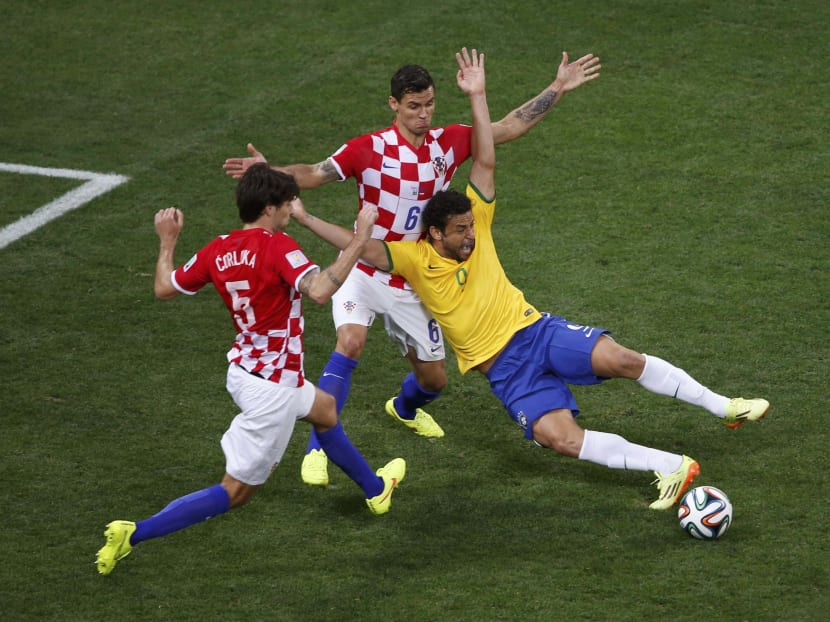Fred’s dive blots Brazil’s moment
After all the acrimony and scandal, the last thing this World Cup needed was for a referee to reward a dive in the penalty box by the host nation’s centre-forward, thus tarnishing a night that should have belonged to Neymar, the elected world beater of this Brazil team.

Fred (right) dropped like a bag of lead under a feather challenge from Croatia’s Dejan Lovren (centre). Photo: REUTERS
After all the acrimony and scandal, the last thing this World Cup needed was for a referee to reward a dive in the penalty box by the host nation’s centre-forward, thus tarnishing a night that should have belonged to Neymar, the elected world beater of this Brazil team.
Not long after elbowing Croatia’s Ivica Olic in the face, Neymar’s dragged shot that brought the hosts level in this dramatic World Cup opening match was a catharsis for the star and his nation.
His disputed penalty, after Fred had dropped like a bag of lead under a feather challenge, was less worthy of celebration. This tournament is ingenuous in finding new ways to alienate its audience. Oscar’s toe-poke for Brazil’s third at the end did not remove the fug of disillusionment.
Pity, because there were two immense emotional highs. The first was a belting out of the Brazilian national anthem that showed how much pressure the country has been under not to embarrass itself in the eyes of the world. The other was when Neymar’s first goal brought squad and staff together for a mass touchline love-in while the Sao Paulo crowd let rip with their joy.
The anthem told a mighty story.
The impromptu acapella encore was so loud, so passionate, that several of Luiz Felipe Scolari’s team started pogoing and shaking their heads around. After the strikes, protests, waste and justifiable cynicism, this was Brazil relocating its togetherness, its love of football and its hope that the next four weeks would achieve what the 1950 final in Rio so miserably failed to do.
As the players went to work, none carried quite the burden of Neymar, still only 22, and the country’s biggest recent footballing export. As if the young waif in the No 10 shirt needed any reminding of his leading role in the country’s quest, Dunga, captain of the 1994 World Cup-winning side, said: “I feel just like everyone else, that Neymar must be more than just a promise. He can’t be a promise; he must be reality in order for us to win the World Cup.”
Dunga’s hope was that, in Brazil’s open spaces and without Lionel Messi to cramp his style at Barcelona, Neymar would join the ranks of his country’s great No 10s by carrying the game to opponents. “His best thing is his dribbling, which he can’t show off at Barcelona,” he said.
Neymar showed plenty to Olic before his goal. Rising for a header, he thrust his arm into the Croatian striker’s jaw and was shown a yellow card. Yuichi Nishimura, the Japanese referee, was doubtless mightily relieved not to have to shoot Bambi minutes into Brazil’s first World Cup for 64 years.
In the anthem, this line caught the eye, or the ear: “Brazil, an intense dream, a vivid ray, of love and hope descends to earth.” Neymar is meant to be that vivid ray.
Frankly, Brazil’s back four give you the heebie-jeebies. The full-backs, Dani Alves and Marcelo, are not hard to get behind and the centre-halves, David Luiz and Thiago Silva, are often not within phoning distance. This open style spreads the play.
But Croatia will not be the only team at this World Cup to see wide open spaces to attack. If the hosts are to slay the demons of 1950, it is likely to be with a risky defensive strategy. This only increases the responsibility on Neymar, who answered the call on 29 minutes when Chelsea’s Oscar danced his way around three Croatian shirts and released the ball for him to advance and cut a left-foot shot wide of Stipe Pletikosa.
The other day, Rivelino, another to wear the sacred jersey, said: “The importance of the No 10 shirt has unfortunately ended. Today the holding midfielders open the game up more than the No 10. What used to be the function of the No 10 doesn’t exist in Brazilian football anymore.”
We gathered for this game in a changed world. Brazilians have a lot to protest about, but the government was never going to allow its US$11.5 billion (S$14.4 billion) splurge to be overshadowed by mass protest.
In the words of the old military junta slogan: “Brazil: Love it or leave it.” Or, as Pope Francis said in a televised message: “To win, we must overcome individualism, selfishness, all forms of racism, intolerance and manipulation of people.” Thus began probably the most political of all World Cups.
The game itself was good. Neymar is off the mark, but there is still no escaping what the head of the Brazilian federation said: “If we don’t win, we’ll go to hell.”
Paul Hayward is the chief sports writer at the Daily Telegraph.





